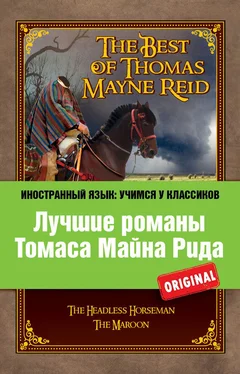sylva – forest
canoe – a light boat, usually with one paddle
phrenological – here: related to a skull; phrenology is a way of judging of a person’s abilities and character from the shape of the skull
oracle – in ancient Greece, a person who asked the gods the questions about the future and gave the answers
myalizm – a kind of local witchcraft
en perdu– frenzy, fury ( French )
neophyte – a person recently converted to some cult or religion
Mohammedans – the followers of Islam
quinteroon – in America, a person who has an African ancestor in the fourth generation
litterateur(s)– writer(s) ( French )
Hecate – in ancient Greek religion, the chief goddess of magic and spell; she is also the goddess responsible for wealth and happiness of daily life
pharmacopoeia – here: substances used for preparing some drug; usually: an official list of medicines and descriptions how to use them
crescendo – a piece of music or voice with gradually increasing of the intensity of sound
exorcism – here: calling out some deity; usually: practice of driving out an evil spirit by prayers or magic
en rapport– in connection with; here: together ( French )
trialogue– a conversation of three persons ( French )
reconnoissance– survey, reconnaissance ( French )
embouchure– entrance, point ( French )
dénouement – here: end (of the affair), outcome ( French )
nicotian – tobacco
shibboleth – speech characteristics, typical for a certain group of people
balustrade – a row of stone or wooden joined balusters round a balcony or terrace
couchant– lying ( French )
sobriquet – a nickname
sans cérémonie– without ceremony ( French )
in propria persona– in person ( Italian )
Niobe – in Greek mythology, a symbol of a bereaved mother; Niobe had twelve children and was too proud of the fact; as punishment for her pride the gods killed her children
Dione – in Greek mythology, a cult partner of Zeus; some authors mention her as the mother of Aphrodite
apostrophe – a passage in a speech or a poem addressed to some definite person; here: a passage
à pied– on foot ( French )
contra-tiempo– incongruous, improper ( Spanish )
felo-de-se – suicide (a legal term)
Lovel – Samuel Lovel (1797–1868), an Irish novelist and painter; he also wrote songs and plays
assize town – a town in which sessions, or sittings, of a court of justice are held
banquette – an upholstered bench standing along the wall
caçadores de cimmarones – here: villains, scoundrels ( Spanish )
ingeniero – here: man ( Spanish )
ingenio – here: estate ( Spanish )
compadre– old chap ( a form of address) ( Spanish )
alcalde(s) – city judge(s) in South America and Spain
dueño– master, owner ( Spanish )
vomito prieto– vomit(ing) ( Spanish )
hombre– man ( Spanish )
Mira – here: Listen! ( Spanish )
un cavallo– a horse ( Spanish )
alforjas – here: trunks, suitcases ( Spanish )
fanfaron– boaster, braggart; here: bragging ( French )
détour– a roundabout way ( French )
Orion – the major and one of the brightest constellations in the sky
penchant– love or inclination for smth/smb ( French )
trousseau– dowry ( French )
couleur de rose– rose colour ( French )
feu-de joie– fire of joy ( French )
syncope – loss of consciousness, fainting
compagnon du voyage– voyage companion ( French )
charybdis – in Greek mythology, the personification of a whirlpool, fatal for shipping
phoenix – in mythology, a bird which burned itself and then rose young from the ashes
Hymen – in Greek mythology, the god of marriage
Конец ознакомительного отрывка
Купить книгу












